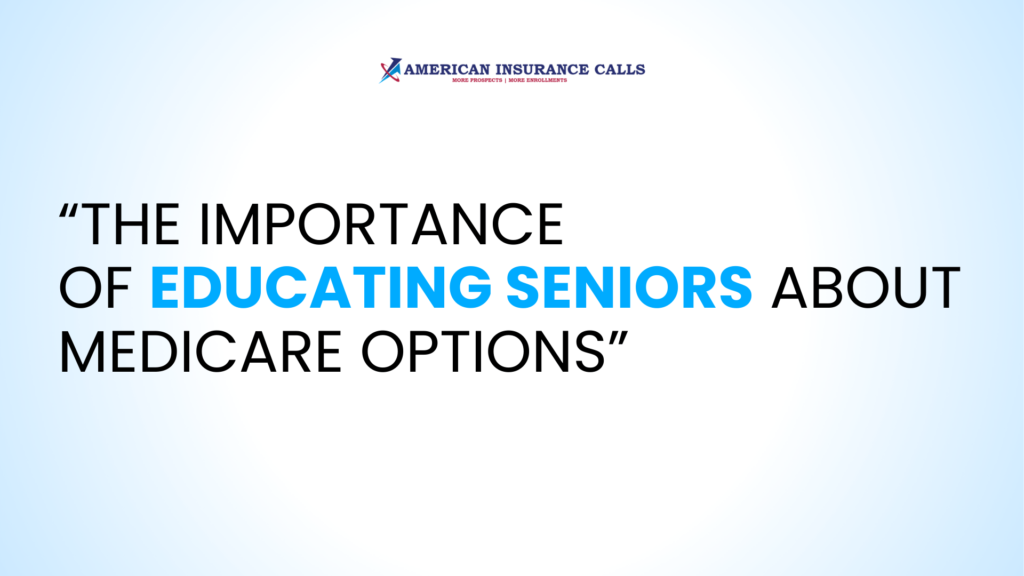Medicare is a lifeline for millions of seniors in the United States, providing essential healthcare coverage during their retirement years. However, the complexity of Medicare options—ranging from Original Medicare to Medicare Advantage, Medigap, and Part D—can be overwhelming for many beneficiaries. As insurance agents and industry professionals, educating seniors about Medicare options is not just a service; it’s a responsibility that builds trust, empowers informed decision-making, and ultimately enhances the quality of care seniors receive.
This article explores why educating seniors about Medicare options is crucial, the challenges they face, and effective strategies to guide them through their Medicare journey.
Why Educating Seniors About Medicare Options is Crucial
1. Medicare is Complex
Medicare consists of multiple parts, each serving a different purpose:
- Original Medicare (Parts A and B): Covers hospital and outpatient services but lacks coverage for vision, dental, and prescription drugs.
- Medicare Advantage (Part C): Combines the benefits of Original Medicare with additional perks like dental, vision, and fitness programs.
- Medigap (Medicare Supplement): Fills gaps in Original Medicare by covering out-of-pocket expenses.
- Medicare Part D: Provides prescription drug coverage.
With so many options and varying benefits, seniors often struggle to understand which plan suits their needs. Education helps demystify these choices, making the decision-making process less daunting.
2. Preventing Costly Mistakes
Selecting the wrong Medicare plan can lead to significant financial burdens. For example:
- Choosing a plan without adequate prescription drug coverage may result in high out-of-pocket costs.
- Failing to enroll in Medigap during the open enrollment period could lead to higher premiums or denial of coverage due to pre-existing conditions.
Educating seniors about these pitfalls ensures they make informed decisions that protect their finances.
3. Promoting Better Health Outcomes
Medicare education ensures seniors choose plans that align with their healthcare needs. A well-chosen plan can:
- Cover necessary treatments and medications.
- Provide access to preferred healthcare providers.
- Offer wellness programs that promote preventive care.
By educating seniors, you empower them to access the care they need to maintain their health and well-being.
4. Building Trust and Long-Term Relationships
Seniors value honesty and clarity. When you take the time to educate them, you establish yourself as a trusted advisor. This trust fosters long-term relationships, leading to client loyalty and referrals.
5. Ensuring Compliance
Medicare marketing and sales are governed by strict CMS regulations to protect beneficiaries. Educating seniors about their options within these guidelines ensures transparency and compliance while avoiding misleading practices.
Challenges Seniors Face When Choosing Medicare Plans
1. Overwhelming Choices
Seniors are often inundated with marketing materials, making it difficult to distinguish between plans and providers.
2. Misinformation
Many seniors receive conflicting information from different sources, leading to confusion and mistrust.
3. Limited Digital Literacy
While some seniors are tech-savvy, many struggle to navigate online tools and resources, limiting their ability to research Medicare options independently.
4. Fear of Making the Wrong Choice
The fear of choosing the wrong plan and facing penalties or inadequate coverage can lead to decision paralysis.
Strategies for Educating Seniors About Medicare Options
1. Simplify Complex Information
Break down Medicare options into simple, digestible explanations. Use clear language and avoid jargon. For example:
- “Original Medicare covers hospital stays and doctor visits but doesn’t include prescriptions.”
- “Medigap helps pay the costs that Original Medicare doesn’t, like copayments and deductibles.”
2. Use Visual Aids
Visual aids like charts, infographics, and videos can make complex information more accessible. Examples include:
- Coverage comparison charts showing the differences between Medicare Advantage and Medigap.
- Infographics explaining how Medicare Parts A, B, C, and D work together.
3. Provide Personalized Guidance
Tailor your recommendations based on the individual’s healthcare needs, financial situation, and lifestyle. For example:
- Suggest Medicare Advantage plans with fitness programs for active seniors.
- Recommend Part D plans that cover specific prescriptions a senior needs.
4. Host Educational Seminars
In-person or virtual seminars are excellent for reaching a larger audience. Topics can include:
- “Understanding Medicare Advantage vs. Medigap.”
- “How to Choose the Right Medicare Plan for Your Needs.”
- “What You Need to Know About Medicare Enrollment Periods.”
Leave time for Q&A sessions to address individual concerns.
5. Use Digital Tools
For tech-savvy seniors, leverage online resources like:
- Interactive plan comparison tools.
- Webinars covering Medicare basics and enrollment processes.
- Downloadable guides or checklists for choosing Medicare plans.
6. Partner with Local Organizations
Collaborate with senior centers, libraries, or community groups to offer educational sessions. This not only increases your outreach but also positions you as a trusted local resource.
7. Leverage Social Media
Platforms like Facebook are popular among seniors and their caregivers. Share:
- Informative posts and videos about Medicare options.
- Updates on enrollment deadlines.
- Testimonials from satisfied clients.
Engage with your audience by responding to comments and questions.
8. Focus on Caregivers
Caregivers often play a significant role in helping seniors choose Medicare plans. Provide them with resources and guidance to simplify the decision-making process.
Best Practices for Medicare Education
- Stay Updated: Regularly review CMS guidelines and Medicare plan updates to provide accurate information.
- Be Transparent: Clearly outline the benefits and limitations of each plan.
- Listen Actively: Understand the senior’s unique needs before offering solutions.
- Follow Up: Check in with clients to ensure they’re satisfied with their plan and address any post-enrollment questions.
The Benefits of Educating Seniors
When seniors are well-informed about their Medicare options, they’re more likely to:
- Choose a plan that meets their healthcare and financial needs.
- Stay loyal to an agent or agency that prioritizes their well-being.
- Refer friends and family, expanding your client base.
Educating seniors also reduces confusion and complaints, streamlining the enrollment process and fostering a positive reputation for your business.
Conclusion
Educating seniors about Medicare options is more than a marketing strategy—it’s a vital service that empowers beneficiaries to make informed decisions about their healthcare. By simplifying complex information, offering personalized guidance, and leveraging various outreach methods, you can build trust, improve health outcomes, and strengthen your business.
Start implementing these strategies today to become a trusted advisor in the Medicare space and make a meaningful impact on the lives of seniors in your community.

